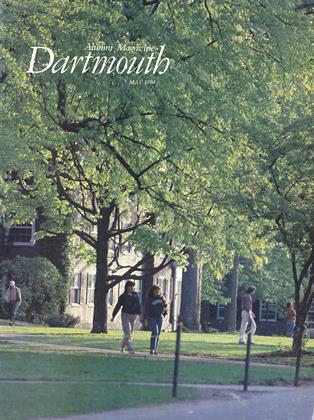In the first week of April, the month Chaucer applauded for its "shoures soote," the Department of English at the University of Florida held a threeday symposium honoring Richard Eberhart '26. "Eberhart at Eighty," the official title of the University of Florida Writers' Festival, was attended by students, writers, and scholars from all over the country. Among the celebrants were Robert Pack '58, poet and English professor at Middlebury College, critic and professor of English emeritus Cleanth Brooks of Yale, and poet Donald Hall, who recently succeeded Eberhart as New Hampshire's Poet Laureate.
After his career at Dartmouth, Eberhart studied at Cambridge University in England (from which he received a B.A.), traveled to Berlin to study German, and then spent a year as a graduate student at Harvard. His experiences as a gunnery officer in the U.S. Navy in World War II formed the basis for one of his most frequently anthologized poems, "The Fury of Aerial Bombardment."
A feisty and familiar figure to many Hanoverians, Eberhart lives on Webster Terrace with Elizabeth, his wife of 43 years. He has been much honored in the 50-odd years since the publication of his first book, A Bravery ofEarth. He has served as Consultant in Poetry to the Library of Congress, was elected to both the National Institute of Arts and Letters and the American Academy of Arts and Letters, and has received several honorary doctorates and numerous awards, including the Bollingen Prize (1962), the Pulitzer Prize (1966), and the National Book Award (1977).
On the eve of his birthday on April 5, Eberhart was feted at the house of the president of the University of Florida at which time he was presented with the Ambassador of the Arts Award and given a handsome pencil sketch. Walking briskly across the dewy campus at Gainesville the previous evening, Eberhart recounted the pleasures poetry had given him over a lifetime. "You know," he said with a sort of limpid twinkle in his eye, "there are some ways in which I might say that poetry has meant everything to me. But then again, it is no substitute for life." This brought to mind a couplet by Thoreau, "My life has been the poem I would have writ/But I could not both live and utter it." If Thoreau failed in that venture, it is clear that octogenarian Richard Eberhart has not.
 View Full Issue
View Full Issue
More From This Issue
-
 Feature
FeatureFeast and Famine
May 1984 By Laurie Kretchmar '84 -
 Feature
FeatureThe Granite of New Hampshire
May 1984 By Debbie Schupack '84 -
 Feature
Feature"The Highest-Ranking Woman in American History"
May 1984 By Shelby Grantham -
 Cover Story
Cover StoryA Return to Dartmouth
May 1984 By Brian W. Ford '67 -
 Class Notes
Class Notes1959
May 1984 By William G. Long -
 Class Notes
Class Notes1956
May 1984 By Clement B. Malin








